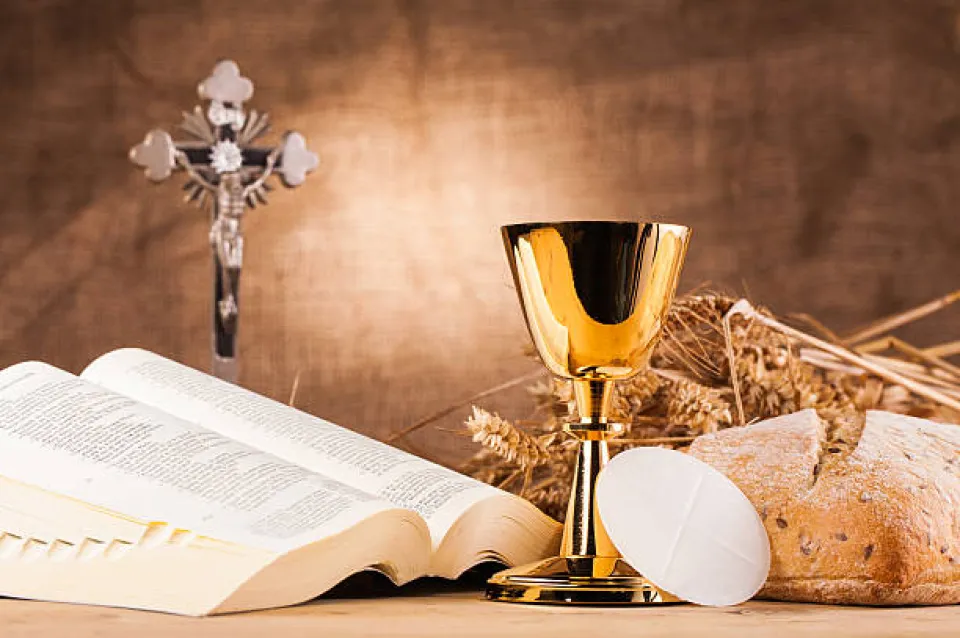“Those receiving the Holy Eucharist with pure hearts are receiving life, while those receiving it in sin are receiving death.”
On June 2, 2024, the Catholic Church celebrates the feast of the "Body and Blood of Christ." At St. Patrick Catholic Church, Ibenda Obolo Eke, Enugu State, Rev. Fr. Emmanuel Obaegu guided parishioners through the meaning of this feast.
Referring to the Bible, he explained that Corpus Christi (the body and blood of Jesus Christ) signifies the new covenant between God and His people. He defined a covenant as an agreement between two parties where each pledges to keep a promise.
He related the feast and covenant to Moses' actions after receiving the commandments at Mount Sinai. According to Exodus 24:3-8, the Israelites promised to observe all the Lord's commands. Moses then took the blood of holocausts and bullocks, cast it on the altar and people, saying, “This is the blood of the covenant that the Lord has made with you.”
After this covenant, the Israelites failed to keep the commandments. They were captured by the Babylonians, who destroyed everything in Israel, including the Ark of the Covenant, and took the Israelites into captivity.
Because of this incident, God said in Jeremiah 31:31-33, “The days are coming when I will make a new covenant with the people of Israel and Judah. It will not be like the covenant I made with their ancestors when I led them out of Egypt, because they broke my covenant... This is the covenant I will make with the people of Israel: I will put my law in their minds and write it on their hearts. I will be their God, and they will be my people.”
Rev. Obaegu explained that because of this, no Christian today can claim ignorance of God's law. He stated that the new covenant is personal, allowing God's children to communicate directly with Him. If one deviates from it, that person alone will be punished. “The new covenant, manifested in the New Testament and it is not like the one through Moses that is communal and attracts communal punishment.”
He cited theologians like St. Teresa, St. Thomas Aquinas, and St. Augustine, who spoke about this personal relationship with God and the new covenant manifesting in the Holy Eucharist.
According to him, "Jesus Christ sealed the new covenant when He gave the disciples His body to eat and blood to drink. During the Passover feast, He broke bread, gave thanks, and said, 'Take it, this is my body.' Then He took a cup, gave thanks, gave it to them, and said, 'This is my blood, the blood of the covenant that will be poured out for many'" (Mark 14:22-24).
The priest stated that “it is a sacrifice made once, which we celebrate today. Though some theorists doubted the transformation of ordinary bread and wine into body and blood, the Church clarified this through the process of "transubstantiation." That is, "trans-" meaning beyond, and "substance" meaning the content that makes an object what it truly is.
He said that substance doesn't change, so individuals will see normal bread and wine, but when the priest speaks the words spoken by Jesus Christ, the same power that made up His blood and body comes into manifestation. "We might not see it with our normal eyes because it is also a mystery beyond human understanding," said the priest.
He cited (John 6:51) where Jesus Christ said, "I am the living bread which has come down from heaven; anyone who eats this bread will live forever." Rev. Obaegu said, “Those receiving the Holy Eucharist with pure hearts are receiving life, while those receiving it in sin are receiving death.”
Fr. Obaegu explained that some benefits of sharing in the Holy Eucharist are:
It brings us closer to God.
It helps reduce our hunger for sin.
It prepares us for eternal life.
To avoid receiving death, one must prepare physically and spiritually. Physical preparation means not eating or drinking alcohol at least an hour before receiving Holy Communion, while spiritual preparation means going to confession and being in a state of grace.
The Catholic Priest therefore urged Christians to renew the covenant made with God during baptism and to continually strive to maintain a good relationship with Him.



